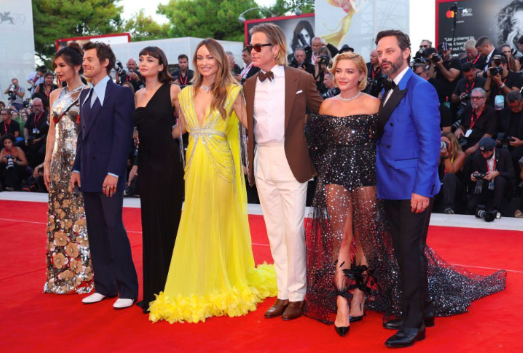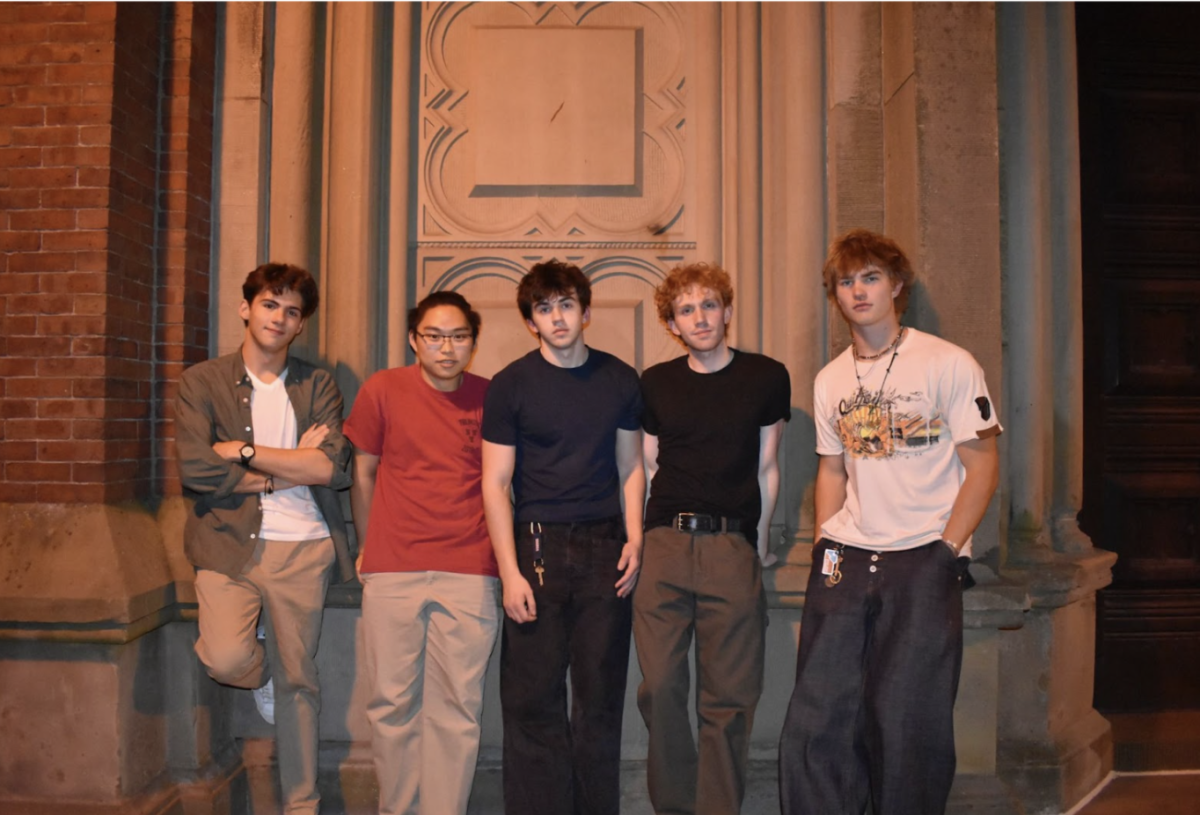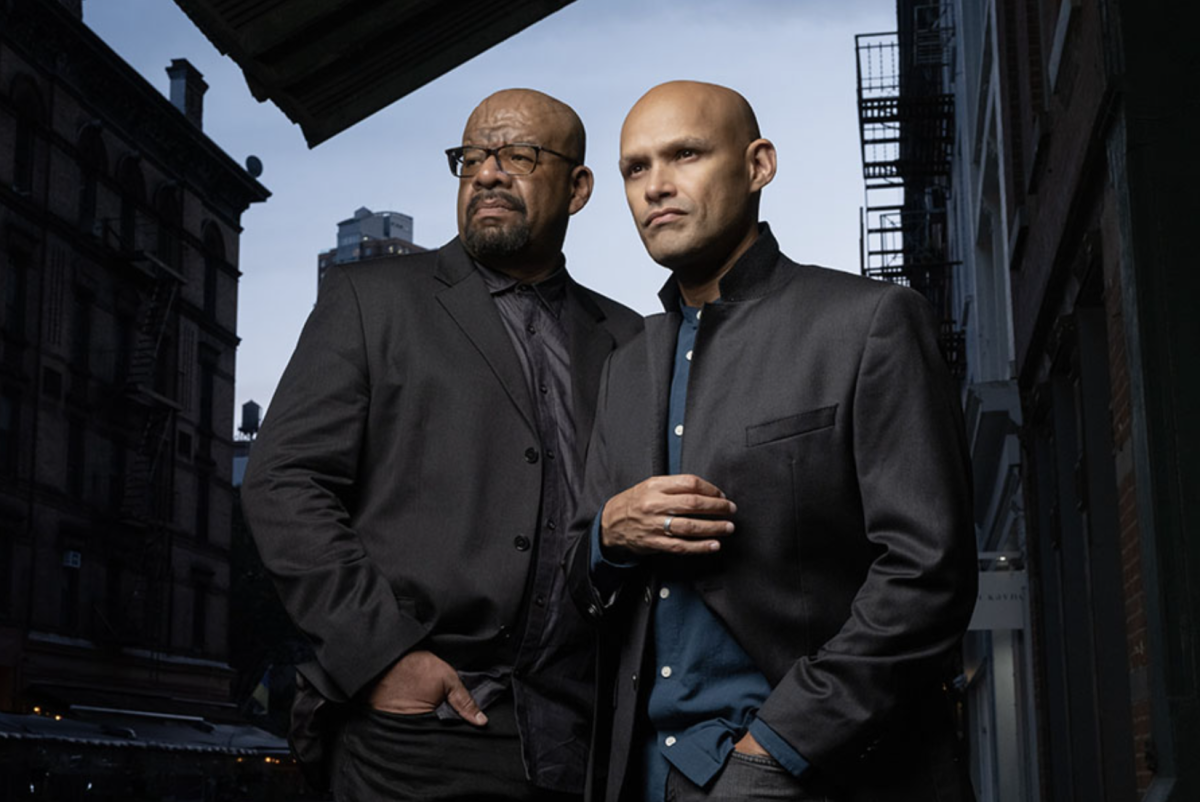In 2019 Carey and Shane Van Dyke wrote the spec script that writer and producer Katie Silberman would later rewrite for director Olivia Wilde’s upcoming 1950s psychothriller “Don’t Worry Darling.” After a bidding war to acquire the project and anticipation surrounding the film’s plot and leads (Florence Pugh, Harry Styles, Gemma Chan and Chris Pine), this descendant of Hollywood’s Blacklist of promising scripts has devolved into an alluring world of scandals and secrets that overshadows — but is not at odds with — the film’s plot.
Judging by the trailer, “Don’t Worry Darling” is a sea of poolside pastels, sharp suits, trays of scotch at cocktail parties and picture-perfect husbands and wives who affirm their love each morning with a definitive “Always. You and Me.”
Surely this is a mask. Behind the cheery “The Oogum Boogum Song” playing, there is a darker reality plucked from the pages of Betty Friedan’s “The Feminine Mystique” and injected with a dose of dystopian flair. In between ballet classes and dinner parties, wives try to suffocate themselves with Saran Wrap and begin to question the classified files their husbands keep in their briefcases.
What starts as a film about an idyllic experimental community in Victory, Calif., unravels to reveal a web of disturbing secrets that Alice (Florence Pugh) pursues with obsessive determination. This fascination with obsessively uncovering secrets is consistent with the attention the film’s alleged behind-the-scenes drama has received.
Perhaps the controversy began when Wilde received custody papers onstage while presenting the film at CinemaCon in April, or when Pugh didn’t promote the film on her social media, fueling rumors about her alleged feud with Wilde. Maybe it was the entirety of the Venice International Film Festival — Chan and Pine acting as human buffers in group photos, Pugh skipping the press conference to walk around Venice with an Aperol Spritz and viewers arguing that Styles spit on Pine. It’s not exactly clear, but from the awkward body language to the “spitcident,” the palpable unhingedness is too chaotic to be contrived.
In the trailer, Alice laments, “Everyone is acting like I’m crazy, and I’m not crazy,” and maybe the flurry of memes, TikToks and news articles are a gateway to unpacking the more problematic aspects of the film.
Wilde told Variety that she wanted her film to explore “what happens when someone is willing to sacrifice a system that serves them in order to do the right thing.” That’s fair, but the decision to set this system in a 1950s-esque world is a puzzling choice because it implies systemic oppression is an element of the past rather than an ongoing, evolving reality. Emphasizing female pleasure (Wilde said, “Men don’t come in this film. Only women here!”) is another questionable choice, given that none of the female characters can give informed consent in the film’s simulated world.
These concerns feel less abstract in the context of Wilde’s conflict with Shia LaBeouf, whom she originally cast in 2020 before Styles replaced him. Wilde stated she fired LaBeouf to create a “safe, trusting environment” and prioritize and support Pugh, who reportedly felt uncomfortable with his behavior, especially after allegations of abuse came to light.
But in August 2022, LaBeouf claimed he quit despite Wilde’s protests to stay and supported his assertion with a video allegedly from August 2020 where Wilde told LaBeouf that she’s “not ready to give up on this yet” and that “this might be a bit of a wake-up call for Miss Flo.”
The controversies surrounding the film — serious and silly — are all-consuming, surpassing the conversations about the film itself. Now that “Don’t Worry Darling” is screening in theaters, audiences may describe the film as a meaningful critique of authoritarianism and a prophetic warning against the incel ideology that shaped the male characters. Or they may leave with nothing more to say than what Styles told the press at the Venice International Film Festival: “…it feels like a movie.






